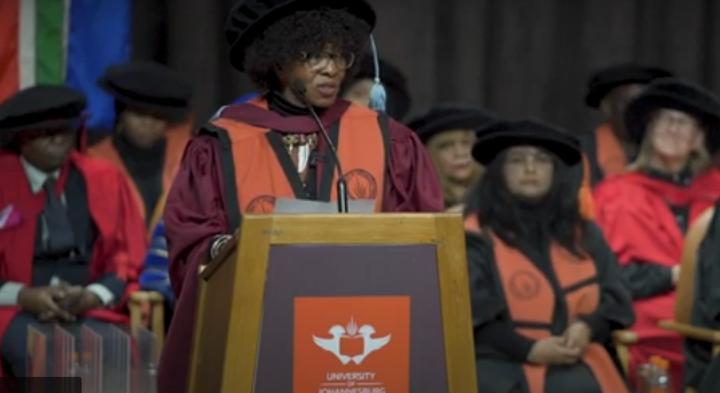Africa-Press – South-Africa. The University of Johannesburg (UJ) has conferred an honorary doctorate on Margaret Busby, recognising her trailblazing role as Africa’s first black woman publisher and her decades-long contributions to global literature.
UJ is the first university on the continent to bestow this honour on Busby, whose extraordinary career has shaped the landscape of pan-African letters, elevated marginalised voices and archived a wealth of intellectual heritage across Africa and its diaspora.
The Johannesburg Institute for Advanced Study (JIAS), in partnership with the Johannesburg Festival of Women Writers (JFWW), held a celebratory lunch in honor of Busby as part of the JFWW, which was founded by former South African ambassador to France and the US, Barbara Masekela.
Among the guests were JIAS fellow and former South African ambassador to France and the US Barbara Masekela, ambassador Nozipho January-Bardill, writer and activist Elinor Sisulu, Brand Leadership founder Thebe Ikalafeng, acclaimed author Sue Nyathi, poet and short-story writer Makhosazana Xaba, former South African first lady Zanele Dlamini Mbeki, and broadcaster and producer Brenda Sisane and Kgomotso Matsunyane.
Speaking at the event, Prof Victoria Collis-Buthelezi, director of JIAS, reflected on Busby’s towering legacy. “I want to humbly say a few words about Dr Busby and what she means to the world of letters,” Collis-Buthelezi began. “Had Dr Busby only ever published Daughters of Africa, her 1992 collection of some 200 women from across Africa and its diaspora, she would have done more than enough to be recognised as one of the most significant figures in pan-African letters.”
An unparalleled chorus of voices from different genres, centuries and regions came together in that historic anthology. Daughters of Africa was woven together in a tapestry of survival, art and intellectual resistance, from the traditional poetry of anonymous African girls celebrating the customs of girlhood to the rebellious poetry of enslaved poet Phillis Wheatley and Sojourner Truth’s well-known rhetorical question Ain’t I a Woman? In addition, Busby’s collection featured the lyrical reflections of Ellen Kuzwayo and Noni Jabavu, the proto-Afrofuturist fiction of Pauline Elizabeth Hopkins, the scathing character-driven stories of Adelaide Casely-Hayford, and the slave narratives of Mary Prince and Harriet Jacobs.
“To convene them was, as Dr Busby herself extols in the first lines of her introduction to the book, to be ‘a thirsty traveller trying to catch a flowing river in a calabash,’” Collis-Buthelezi said. “It was to cement a field of study black women’s writing and archive a community.”
But Busby’s influence goes far beyond just one book. She worked tirelessly to bring stories that others thought were unmarketable to the world as a co-founder of the publishing house Allison & Busby (A+B), which was established in 1967 when she was just graduating from college. Sam Greenlee’s 1969 satirical novel The Spook Who Sat by the Door, which centres on the fictional first black CIA agent who uses his training to incite revolution, is among the most striking examples.
By the time Busby came across the manuscript, it had been turned down by about 40 American publishing houses. Unfazed, she took out a loan to help Greenlee finish the project, and the novel was published by A+B to positive reviews. Busby pressed The Observer to print an excerpt after the publication refused, and eventually it did. Ivan Dixon’s 1973 film adaptation of the same book is widely regarded as a forerunner to subsequent cinematic investigations of black radical politics, such as Ryan Coogler’s Sinners, which is currently receiving praise for its unique fusion of genre subversion and political satire.
Collis-Buthelezi noted, “Sinners and the kind of autonomy of making it afforded Ryan Coogler by commercial Hollywood would not have been possible without Ivan Dixon’s film, and Dixon’s film would not have existed without Dr Busby’s tenacity.”
Busby has also been an editor, broadcaster, essayist, and cultural custodian. Over six decades, she has shaped reading lists, championed new generations of writers, and created space for stories that interrogate, celebrate and reimagine black life. She published the works of Buchi Emecheta, CLR James, George Lamming, and many more. Her contributions have helped transform publishing from an exclusionary industry into a more inclusive platform for pan-African ideas and narratives.
For More News And Analysis About South-Africa Follow Africa-Press






